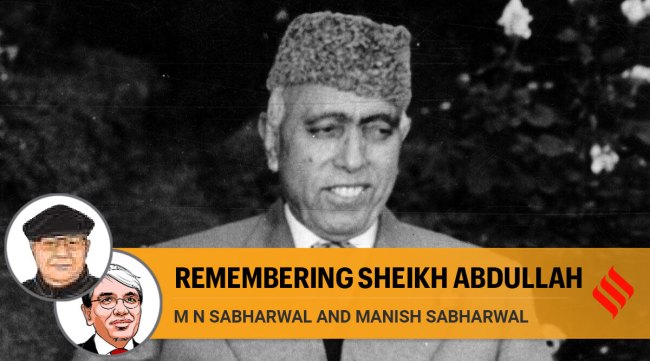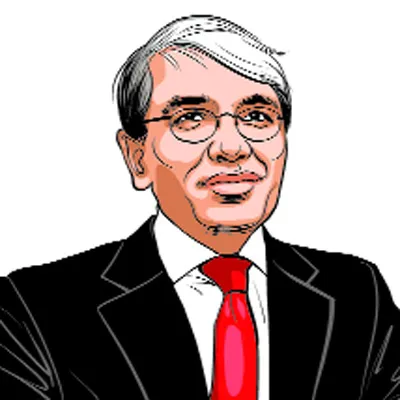Opinion With Bharat Jodo Yatra ending in Kashmir, a reason to remember Sheikh Abdullah
Let’s recall his nationalism, pragmatism, and even imperfections, as we imagine a Naya Kashmir.
 "Sheikh Abdullah, like all humans, was imperfect. He made feeble attempts to win the people of Jammu and Ladakh," write M N Sabharwal and Manish Sabharwal. (Express archive photo)
"Sheikh Abdullah, like all humans, was imperfect. He made feeble attempts to win the people of Jammu and Ladakh," write M N Sabharwal and Manish Sabharwal. (Express archive photo) The Bharat Jodo Yatra ended ironically with a divisive public rant against “outsiders” doing business in J&K. This lack of understanding of India’s Constitution (there are no outsiders within our borders) and lack of appreciation for the hard-fought recent gains to integrate J&K — India’s Constitution fully applies there only since 2019 — makes us nostalgic for the time when President Giani Zail Singh openly wept at Srinagar in 1982 after Sheikh Abdullah’s death. “I have lost my leader,” he said. Gianiji was referring to Sheikh Sahib’s presidentship of the All India State Peoples’ Conference that agitated against the undemocratic royalty allied with the undemocratic British. Since Sheikh Sahib’s considerable legacy is being diminished by his party let’s take a closer look at his nationalism, pragmatism, and imperfections, as we imagine a Naya Kashmir.
Sheikh Abdullah’s nationalistic and political consciousness sparked at the University at Aligarh in the 1920s but synthesised in the Muslim Conference formed after Maharaja Hari Singh’s forces fired on peaceful protesters in 1931. In 1938, he renamed the party National Conference to broaden support. M A Jinnah thought the Sheikh was a “rotten egg” with secular ideas who would oppose integration with Pakistan — this probably drove his attempt to forcefully annex Kashmir in 1947. The Maharaja jailed Sheikh often but ironically handed him leadership as “Emergency Administrator” after terrorists enforced the Maharaja’s hasty retreat from Srinagar to Jammu. Sheikh often said “Hamne to Hukumat Lal Chowk mein pari pai” (we found the government lying in Lal Chowk) and ably assisted the Indian army in hunting down retreating the disguised Pakistani terrorists. His 1948 speech to the United Nations was clear: Kashmir was a part of India. Later, the Sheikh privately told US ambassador Loy Henderson that if independence was impossible, Kashmir preferred India over Pakistan.
Sheikh Abdullah was a pragmatic politician. He abandoned the most radically communist provisions of his 1942 Naya Kashmir memorandum once in power. He believed the LOC should be India’s national boundary because the people in the territory occupied by Pakistan were not Kashmiri. Nehru arrested him in 1953, but he accepted Nehru’s offer to visit Pakistan in 1964 and seek peace. In 1975, he sidelined party hardliners like Fakhr-e-Kashmir Mirza Afzal Baig and dissolved the Plebiscite Front to sign an accord with Indira Gandhi. In 1975, despite being Chief Minister with Congress support, Sheikh Sahib didn’t implement the Emergency provisions or jail any Jana Sangh or RSS leaders. He threatened to counter Islamic fundamentalism by becoming a “mullah” but banned a proposed international conference of the Jamaat–e-Tulba in Srinagar. Abdullah supported the RSS candidate Vaid Vaishno Dutt in the Jammu Municipal elections and his continued defiance led Indira Gandhi to fly 175 income tax officials to raid his associates, which he considered “a raid on me.” But the Sheikh reconciled with Mrs Gandhi just before his death — Sher-i-Kashmir knew that politics is the art of the possible.
Sheikh Abdullah, like all humans, was imperfect. He forced Nehru to banish Maharaja Hari Singh to Mumbai and replace him with Karan Singh. He made feeble attempts to win the people of Jammu and Ladakh. He often used religion in politics. In 1980, he led the Eid prayer at Idgah instead of the Mirwaiz to deliver a message to Indira Gandhi. As chief minister, he banned the entry of national civil servants into the state government to promote “committed” state officers. In his last years, Kashmiris began calling him kunba parast. He didn’t make the National Conference a cadre-driven meritocracy but gifted the party to his family.
Sociologist Max Weber identified three sources of authority. The first was the authority of the eternal yesterday, that is, sanctified through past legitimacy. The second was the authority of extraordinary personal charisma. The third was the authority of the legality of the statute based on rationally created rules. Sheikh had all three sources and used them to deliver ambitious visions in healthcare (the Soura institute modelled on PGI Chandigarh), tourism (the convention centre modelled on Swiss infrastructure) and pride (Hazratbal modelled on Madina). But his successors have run out of authority because they haven’t fought terrorism or considered it evil as Sheikh Abdullah did. Farooq Abdullah’s suggestion that unemployment and poverty birthed terrorism got a sharp retort from then Home Minister P Chidambaram. “If that were true, then large parts of India would have been disturbed,” he said. In 1989, on hearing rumours about plans to desecrate Sheikh’s grave and terrorist leader Hamid Sheikh’s father being called Baba-e-Quom, Begum Abdullah told one of us, “nashukre kashmiri; mere shauhar ne inko izzat bakshi (ungrateful Kashmiris; my husband got them identity). If Begum Akbar Jahan were alive, she would recognise that Kashmiris were enacting what historian Ramachandra Guha calls the reverse biblical curse – instead of the sins of the father being imposed on future generations, the sins of the next generations are being imposed on the father.
Subrata Mitra’s book Governance suggests that pessimists who predicted India would fall apart have been proved wrong because we have artfully balanced the state as a legal institution that is part of the Constitution and the state as a political organisation that is part of society. In the next state election – the first under India’s Constitution – this balance may not be entirely coherent but is sufficiently plausible to merit serious consideration by the people of J&K. Article 370 was always temporary. Today, it is unavailable to sabotage competitive local politics and the constantly negotiated relations between the Centre and state – that’s what differentiates India from Pakistan. History has its eye on the Gupkar alliance and Congress. Will they follow the instinct of the entitled elite and protect privilege? Or fight the next election for Naya Kashmir taking the advice that Giuseppe Lampedusa gave elites in The Leopard, “If we want everything to remain the same, everything must change”?
The writers are a former Director General of J&K Police and a J&K-born entrepreneur






